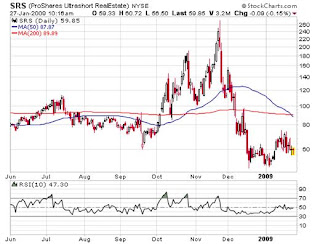The December Existing Home Sales report actually surprised to the upside, posting a gain of 6.5 percent versus November. This equates to roughly 290,000 units.
It turns out that I just underestimated how bad the housing market is. These sales aren’t from eager buyers who got priced out of the market during the run up over the last few years. The buyers are vultures, swooping in and cleaning the carcass. Over 45 percent of the sales were “distressed” according to the report.
That is bad news for the market. It is just the beginning of a viscous cycle.
Foreclosures continue to drive down prices in all markets. As a result, more and more homeowners see their equity vanishing. Many more find themselves underwater. This leads many to simply throw in the towel and let their own home go into foreclosure, feeding the cycle.
Another item to consider is whether or not all the bank-owned foreclosures are even back on the market yet. There is growing evidence that banks are holding back properties from being re-listed to avoid flooding the market, which would result in prices being driven down below what they hope to get for the repossessed homes. This means there could be an additional backlog of properties that we aren’t even aware of yet. This will delay any recovery.
Finally, a major question that needs to be answered is how many people actually qualify to buy a home? Fannie and Freddie are said to be toughening up on standards, and banks are just flat out not lending. That means short of a huge down payment or an all-cash purchase, buying any home, foreclosure or not is going to be difficult. And the housing market needs buyers to move the inventory.
With all this gloom in the market, it is going to take quite some time for a recovery. That leaves you plenty of time to profit from the slide in the housing market. One way is shorting the iShares Real Estate Index (IYR), another is shorting the Vanguard REIT ETF (VNQ). Both have already seen a significant down leg, but with the housing market the way it is, there is still plenty of room to the down side.
A more speculative play could be the UltraShort Real Estate ProShares (SRS). This ETF moves inverse to real estate, so it goes up as the market goes down. A quick look at the chart shows a huge spike in November and a drop since then. It is now trading at two-year lows, so you could view it as a more speculative play on the continuing decline of the housing market.

By Christian Hill
Posted 28Jan2009
more lastest stock articles in www.stockmarketwatch.info
Disclaimer…The subject matters expressed above is based purely on technical analysis and personal opinions of the writer. it is not a solicitation to buy or sell
No comments:
Post a Comment